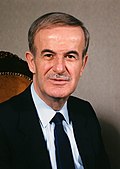| ||||||||||||||||||||||
All 250 seats in the Parliament of Syria 126 seats needed for a majority | ||||||||||||||||||||||
|---|---|---|---|---|---|---|---|---|---|---|---|---|---|---|---|---|---|---|---|---|---|---|
| Registered | 6,691,323 | |||||||||||||||||||||
| Turnout | 82.22% ( | |||||||||||||||||||||
| ||||||||||||||||||||||
| ||||||||||||||||||||||
 |
|---|
|
Parliamentary elections were held in Syria were held between 30 November and 1 December 1998 to elect members of the People's Council of Syria, the unicameral parliament. [1] The result was a victory for the Ba'ath Party, which won 135 of the 250 seats. [2] Voter turnout was 82%.

